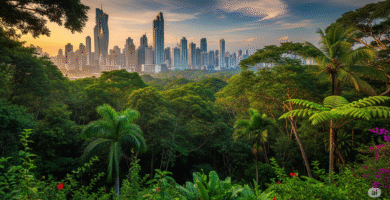Thinking about moving to Panama, retiring here, or just curious about how life works in this tropical paradise? Panama Life Hub is your one-stop resource for expats and future residents. From healthcare and finances to relocation and daily living, we’ve got you covered.
Health Care in Panama: What Every Expat Should Know
Healthcare is one of the top reasons expats choose Panama. The country offers modern private hospitals, affordable medical services, and a strong network of pharmacies. While the public system exists as a safety net, most foreigners rely on private care for speed and quality. Here you’ll find guides on hospitals, insurance, pharmacies, and first-hand experiences from expats who have navigated the system.

Health Tips for Expats in Panama: Staying Healthy in a Tropical Paradise

Emergency Services in Panama: What Expats and Travelers Need to Know

Best Hospitals and Clinics in Panama for Expats and Travelers

Medicare in Panama: What U.S. Retirees Really Need to Know

Health Insurance in Panama: What Expats Need to Know

Cost of Healthcare in Panama: Beyond the Price Tag

Medicine in Panama: What Expats and Travelers Need to Know

Pharmacies in Panama: A Complete Guide for Expats

Panama Healthcare System: Public and Private Options for Expats

Healthcare in Panama: Complete Guide for Expats
Panama Expats: Discover Why This Country Is a Top Choice for Relocation
Moving abroad is always an adventure, and Panama stands out as one of the most attractive destinations for expats worldwide. Known for its tropical climate, friendly tax policies, and growing expat communities, Panama offers a unique blend of modern city life and laid-back rural charm.
In this guide, I’ll share everything you need to know about being an expat in Panama, from the best places to live to the realities you won’t find in glossy brochures.

Finance in Panama: A Complete Guide for Expats & Nomads

Moving to Panama: Complete Guide to Visas, Costs, and Safe Relocation

Living in Panama: Insider Guide to Costs, Safety, and Lifestyle (2025)
Why Expats Love Panama: Culture, Climate, and Lifestyle
Panama offers a mix of benefits that make it a top choice for relocation. The country uses the US dollar alongside its currency, making financial transactions straightforward for Americans and many foreigners. Its year-round warm weather is perfect for those escaping cold winters, and the cost of healthcare is significantly lower compared to the United States and Europe.
The culture is vibrant and diverse, influenced by indigenous roots, Spanish heritage, and global connections due to the Panama Canal. However, it’s essential to recognize that the cultural experience may not always align with your expectations. For example, you may encounter children begging or selling things on the streets, and sometimes mentally ill individuals may approach you insistently for money. They may look rough, but generally, they are not dangerous. This is part of the reality that newcomers must adapt to.
Panama’s relaxed lifestyle attracts retirees, remote workers, and digital nomads who appreciate a slower pace of life. However, this slower pace also applies to services and bureaucracy—patience is key!
Cultural Differences and Real-Life Challenges You Should Know
Every expat experiences some level of culture shock when moving to a new country, and Panama is no exception. Language is the first barrier—while English is spoken in some areas, especially by other expats, Spanish is the dominant language. You would have remembered the frustration of trying to explain something in English, and the person who only spoke Spanish simply couldn’t understand you. If you don’t speak Spanish, it can be isolating.
Another thing to keep in mind is the contrast between urban and rural Panama. In smaller towns, life shuts down early, and public transportation becomes less accessible at night. This can make you feel cut off if you’re used to 24/7 convenience.
Despite these challenges, Panama has a warmth that expats quickly appreciate. In many rural communities, Panamanians are friendlier and more helpful than in the bustling capital. The slower pace of life, while frustrating at first, eventually becomes one of the things you may love most about living here.
Pros and Cons of Becoming an Expat in Panama
Pros:
- Affordable cost of living (depending on location)
- Warm climate and beautiful nature
- Friendly local communities and strong expat networks
- Attractive tax policies and retirement incentives
- Access to both modern city life and peaceful rural living
Cons:
- Cultural differences and language barriers
- Limited services in rural areas after dark
- Some infrastructure challenges (poor lighting, roads)
- Occasional feelings of isolation if you don’t speak Spanish
- A slower pace of life may be frustrating for some
Understanding these pros and cons helps you make an informed decision and prepare for your move.
Tips for a Smooth Transition to Life in Panama
If you’re planning to make Panama:
Get ready to embrace your new life in the tropics with confidence and ease.
- Learn Spanish – Even basic Spanish will make your life much easier.
- Visit before you move – Spend time in different regions to see where you feel most comfortable.
- Join expat groups – They provide support, advice, and friendships.
- Adjust your expectations – Panama is not a copy of your home country; embrace the differences.
- Be patient with bureaucracy – Processes may take longer than you expect.
- Choose your location wisely – Rural towns have charm but also limitations.
These tips, combined with the experiences shared here, will help you integrate successfully into Panamanian life.
Ready to Start Your Journey? Here’s What’s Next
Panama is a land of contrasts, opportunities, and challenges. It offers a unique experience for expats willing to embrace its culture and adapt to a new way of life. While you may face cultural shocks and practical hurdles, the rewards—friendly communities, affordable living, and a lifestyle that blends adventure with relaxation—are worth it.
If you’re ready to take the next step, explore our guides on Healthcare, Moving to Panama, Living in Panama, and Finance in Panama to plan your relocation with confidence.
Your new life in Panama awaits!
8 Frequently Asked Questions About Being an Expat in Panama
1. Is Panama a good place for expats?
Yes! Panama is one of the most popular destinations for expats thanks to its warm climate, affordable cost of living, and welcoming communities. The country also offers attractive residency programs and tax benefits, making it ideal for retirees and remote workers.
2. Do I need to speak Spanish to live in Panama?
While you can get by with English in Panama City and areas with large expat communities, Spanish is the primary language. Learning basic Spanish will greatly improve your experience and help you integrate better into local life.
3. What are the best places to live for expats in Panama?
The top choices include Panama City (modern and vibrant), Boquete (cool climate and strong expat community), Coronado (beach lifestyle), and Volcán (quiet mountain living). Each offers a different lifestyle, so it depends on your preferences.
4. How much does it cost to live in Panama as an expat?
The cost of living varies by location. Panama City is more expensive, while smaller towns are more affordable. On average, many expats live comfortably on $1,500–$2,500 per month, depending on housing and lifestyle choices.
5. Is Panama safe for expats?
Overall, Panama is safe, especially in expat-friendly areas. However, like any country, it’s important to stay aware of your surroundings, avoid poorly lit streets at night, and take basic safety precautions.
6. What is the healthcare system like in Panama?
Panama offers quality healthcare at a fraction of the cost compared to the US or Europe. Private hospitals in Panama City have excellent services, while rural areas may have more limited options.
7. Can I retire in Panama easily?
Yes! Panama has one of the best retirement programs in the world, the Pensionado Visa, which offers discounts on healthcare, entertainment, and travel. Many retirees find Panama to be an affordable and enjoyable place to settle down.
8. What should I know about daily life in Panama as an expat?
Daily life varies between urban and rural areas. In the city, you’ll have access to modern amenities, while rural towns offer a slower pace. Keep in mind that many businesses close early, public transport is limited at night, and adapting to cultural differences is part of the experience.
